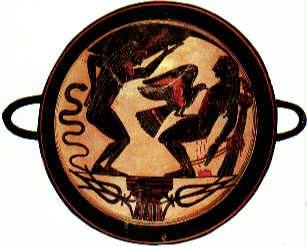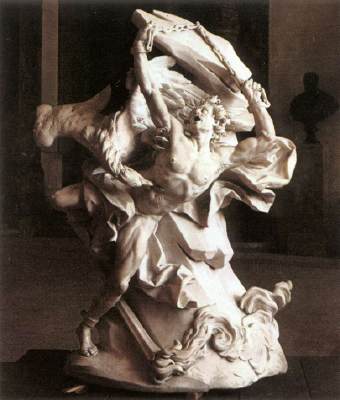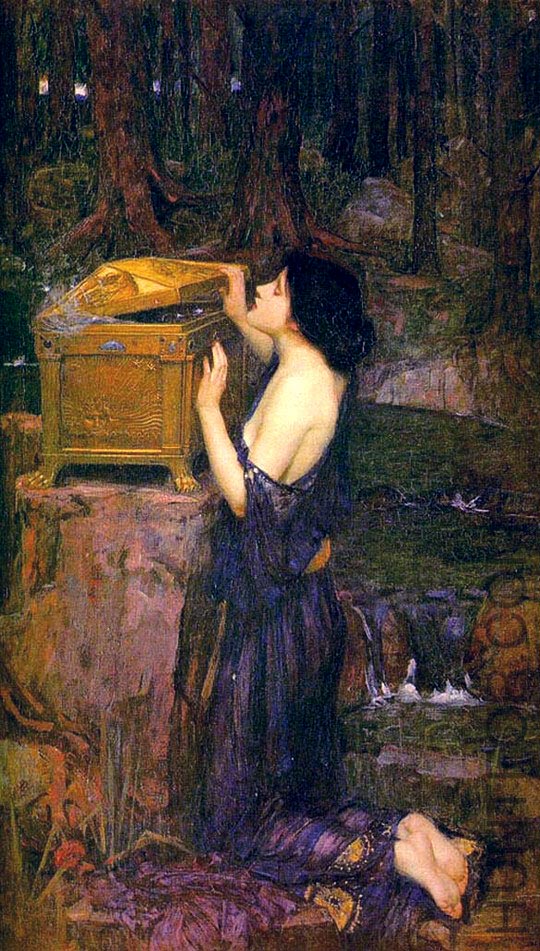Prometheus, Epimetheus and Atlas Prometheus was a Titan. He had three brothers; Epimetheus, Atlas and Menoetius. Atlas ruled over the land that we know as Atlantis. It was said to lay beyond the Pillars of Herakles (the Straits of Gibraltar), and a chain of fruit-bearing islands separated it from a farther continent, unconnected with ours. Protagonists of 'ancient wisdom' and all that sort of thing may say that if Atlantis was actually in the Atlantic, then the 'fruit-bearing islands' could well be the West Indies, and the 'farther continent' would therefore be . . . .. but of course the old Greeks knew nothing of the existence of the Americas, did they? One version of the story of Atlantis says that it was comprised of a huge central plain completely surrounded by hills, except for one gap to connect it to the sea. The Atlanteans were master builders, and had palaces, baths, great harbour-works and temples when most other people were still living in mud huts. They were, however, warlike, and not only carried war into the westward continent, but also to the east as far as Atlas and Menoetius joined Cronus and the Titans in their war against the Olympian gods - which they lost. Zeus killed Menoetius with a thunderbolt and sent him down to Tartarus. He spared Atlas' life but condemned him to support Heaven on his shoulders for all eternity. One day there was a dispute as to which portions of a sacrificial bull should be offered to the gods and which should be reserved for men. Prometheus was asked to arbitrate, and he made up two equal bags out of the skin of the bull. In one he put all the meat, but covered it with the stomach, which is the least attractive part of an animal. The other bag he filled with the bones, but covered them with a rich layer of fat (highly prized in a Bronze Age economy). When he asked Zeus to take his pick, Zeus - easily fooled - picked the bag of bones. When he discovered that Prometheus had tricked him he punished him by withholding fire from humankind - he decreed that men could indeed have the flesh, but they must eat it raw! Prometheus went to Athene and pleaded with her to let him into Now Zeus really got angry. He ordered Hephaestus to make a beautiful woman out of clay and got the four Winds to breathe life into her and the goddesses to dress her. This woman, Pandora, was the most beautiful woman there has ever been, and Zeus sent her to Epimetheus. Prometheus, however, knew that trouble was coming, and had warned Epimetheus to accept nothing from Zeus, so Epimetheus respectfully declined Zeus's gift. That was the last straw for Zeus - he had Prometheus taken to the Caucasian mountains where he was chained naked to a pillar. A voracious griffon-vulture was sent to tear at his liver all day, year in, year out, and the pain never ended because every night Prometheus was exposed to the aching cold and frost while his liver grew back again. Zeus excused his cruelty by saying that Prometheus had tried to seduce Athene, but everyone knew this was a lie. Epimetheus was alarmed at Zeus's vindictive behaviour towards his brother, so hastened to marry Pandora. One day Pandora found a box that had been given to Epimetheus by Prometheus. Prometheus had warned his brother never to open the box, and when Pandora asked Epimetheus what the box contained, he also warned her not to touch it. But she had been fashioned by Zeus to be foolish, lazy and mischievous, and as soon as Epimetheus turned his back she opened the box. Horror! What was in the box was all the evils that nowadays plague mankind; Old Age, Labour, Sickness, Insanity, Vice and Passion flew out in a great cloud and stung Pandora and Epimetheus in every part of their bodies, then went out into the world to cause misery for mortals for all time. Only Hope dissuaded mankind from collective suicide by persuading people that life was still worth living (the ancient Greeks thought of Hope as yet another evil, rather than something good. Most modern versions of the story have Hope as a saving grace which is left after the evil has spread, but I think the Ancient Greeks were referring to false hope that is without foundation).
|
 Atlas and Prometheus
 Atlas holding up the heavens
 Prometheus chained  Statue of Prometheus attacked by the griffon-vulture by Nicolas-Sébastien Adams  Pandora by John William Waterhouse |